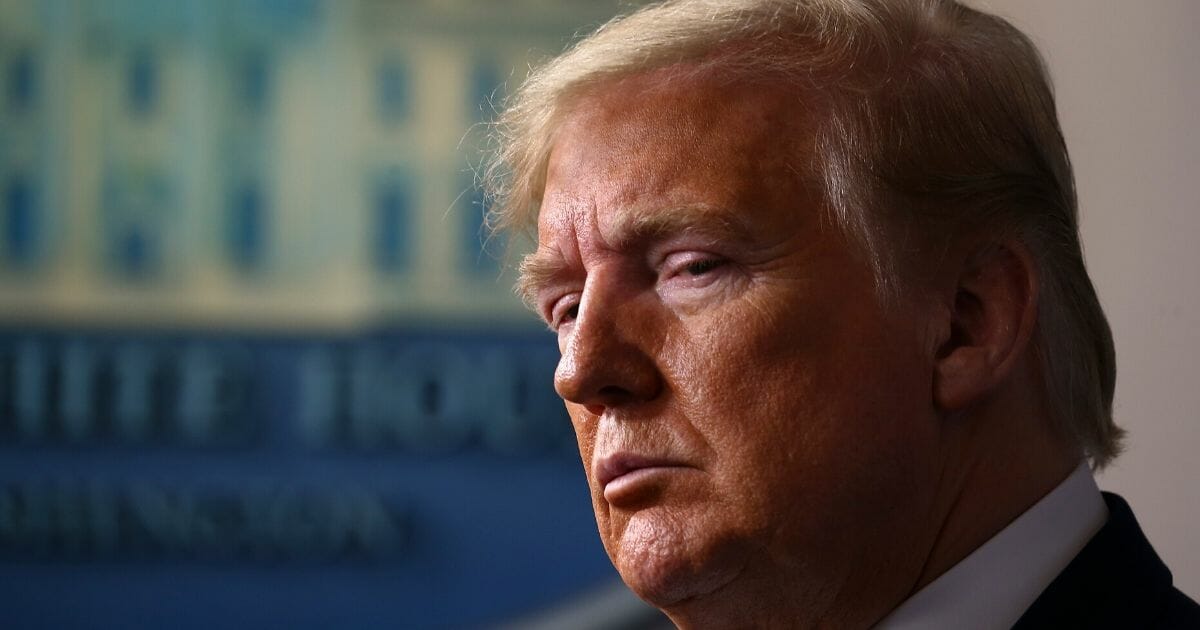
Op-Ed: Trump's 'Total Authority' Comment Was Brilliant Chess Move
If you paid attention to the mainstream media last week after the coronavirus news conference on April 13, you would have thought that President Trump had gone full-bore Idi Amin.
A Politico headline declared, “Trump claims ‘total authority’ over state decisions.” A HuffPost headline trumpeted that “Twitter Erupts Over ‘Emperor’ Trump’s Claim His ‘Authority Is Total.’”
Pundits proclaimed that Trump is a “wannabe totalitarian” who is “envious of authoritarians” like Kim Jong Un and Vladimir Putin and compared him to dictators like Mussolini.
New York Gov. Andrew Cuomo asserted that Trump had declared himself king. “We don’t have a king,” he said. “We have a president. That was a big decision. We ran away from having a king, and George Washington was president, not King Washington. So the president doesn’t have total authority.”
To be fair, Cuomo is right on that point, but his argument is a straw man. Here’s the thing: President Trump never claimed to have absolute authority over everything.
Trump’s actual remarks were that “the authority of the President of the United States, having to do with the subject we’re talking about, is total.” In their reportage, however, the mainstream media selectively omitted President Trump’s qualifying language.
The subject they were talking about, of course, was the reopening of businesses nationwide that had been shuttered by state or local rules as a result of the coronavirus, and the fact that certain governors had banded together to resist any federal order directing the states to reopen faster than the governors want.
On that subject, President Trump was correct that the federal government, not the states, has the final word.
The President Was Right on the Law
On March 13, President Trump declared a national emergency concerning the coronavirus under the National Emergencies Act. This declaration unlocked many executive powers that, under normal circumstances, are unavailable to the president, including the power to regulate many aspects of the economic life of the nation.
But the president’s authority to determine the economic trajectory of the country after a national public health crisis goes beyond mere statutory authority – it has constitutional underpinnings.
The Constitution’s Commerce Clause vests the power to regulate interstate commerce in Congress. As interpreted by the Supreme Court, this provision also serves as a restraint on states, preventing them from taking actions that unduly burden interstate commerce.
In this context, a state’s refusal to follow the federal government’s directives to reopen the economy would likely run afoul of the Commerce Clause.
One of the reasons why we traded the Articles of Confederation for the Constitution was to give the federal government the power to regulate the national economy – in times of domestic tranquility and especially in times of national emergency. As Noah Webster stated, “So long as any individual state has power to defeat the measures of the other[s], our pretended union is but a name, our confederation, a cobweb.”
Moreover, the multi-state pacts that President Trump was talking about at his Monday briefing violate the Constitution’s Compact Clause, which provides that “[n]o State shall, without the Consent of Congress … enter into any Agreement or Compact with another State.”
The Supreme Court has held that this prohibition applies to agreements between States that may increase states’ political power and “encroach on or interfere with” federal authority. Congress, of course, never consented to these states banding together in regional leagues to resist federal directives about reopening the national economy.
Cuomo asserted that the 10th Amendment allows the states to decide for themselves when to reopen businesses within their respective borders.
However, the 10th Amendment provides that powers not delegated to the federal government by the Constitution nor prohibited by it to the states are reserved to the states. Because the Constitution plainly empowers the federal government to regulate the national economy and clearly prohibits states from interfering with that power, Cuomo’s 10th Amendment argument falters.
Indeed, the past three presidential administrations have agreed that a nationwide pandemic would require a federal response, and that the federal government would have total authority in directing the process.
Homeland Security Presidential Directive 21, ordered by then-President George W. Bush, recognized the need for, and created, a national strategy, organized at the federal level, to address “catastrophic health events” such as “a 1918-like influenza pandemic.” President Obama adopted this directive as well, although don’t count on the MSM to tell you that.
And, importantly, HSPD-21 compels the president and the federal government to consider the effect of their decisions – presumably including the public health consequences of any decision to reopen the economy – on states and localities.
This eliminates concern that federal control over the national economy will clash with states’ powers to make and enforce laws related to health and public safety.
The President’s Pivot
But despite the strength of his legal position, President Trump announced Thursday that he has decided, after all, to defer to governors on when to ease coronavirus restrictions. Make no mistake, this was a tactical concession, not a confession of error, and one driven by practical considerations.
First, the federal government cannot commandeer state and local police to enforce federal policies or compel businesses to open their doors if they don’t want to. Next, litigating the issue in a multitude of courts throughout the country is far from efficient or expedient.
Yes, the president could federalize the National Guard to protect businesses that do want to reopen from interference by state and local officials.
President Kennedy did something similar when, after the Supreme Court struck down segregation in Brown v. Board of Education, Alabama Gov. George Wallace stood in the doorway of the auditorium at the University of Alabama and attempted to block the entry of two African-American students.
But the optics here would not be nearly as compelling, and if the reopening precipitates a resurgence in coronavirus cases and deaths, it would be an out-and-out disaster – especially in an election year.
Given these practical challenges, why did President Trump assert so stridently that he had total authority to reopen the economy, even if true?
It was a honey trap. A maneuver that he knew would elicit a particular response from his detractors. And it worked like a charm.
As it stands now, Trump has nothing to lose by deferring to the governors.
If things go well, his flexibility will be heralded by conservatives who value the 10th Amendment and are suspicious of a strong centralized government. Even those who dislike the president will appreciate how he helped navigate us through this crisis.
And if things go poorly, the blame will fall on the governors who demanded control. After having pilloried President Trump for asserting that the federal government has the legal authority to call the shots on reopening the economy, the governors and the MSM will be unable to assail him not having done so.
It was a masterful stroke. Donald Trump is not a king, but on this he does get to say “checkmate.”
The views expressed in this opinion article are those of their author and are not necessarily either shared or endorsed by the owners of this website. If you are interested in contributing an Op-Ed to The Western Journal, you can learn about our submission guidelines and process here.
Truth and Accuracy
We are committed to truth and accuracy in all of our journalism. Read our editorial standards.
Advertise with The Western Journal and reach millions of highly engaged readers, while supporting our work. Advertise Today.












